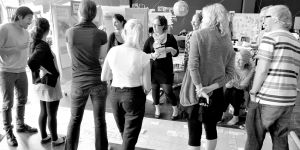
Innovation summer schools are courses in which the teaching and group work takes place at the same location throughout the course, and the course is taught through innovation processes. An innovation summer school is characterized by the following:
- A limited number of students (20-50) working in interdisciplinary teams.
- The course runs within a limited period (1-5 weeks) during the summer or winter.
- The teaching format is characterized by group work, active participation in class and project oriented teaching.
- Takes place on location (e.g. at a company, in an urban space) outside of the university (or in specially designed rooms on campus)
- The teacher’s role is to a large extend to facilitate
- The students’ projects involve real life challenges from the external stakeholders
- The course cooperates with experts and practitioners from private and public organisations in different phases of the course
Innovation summer schools might seem more intense compared to courses that are part of the ordinary semester structure, and the students may find the innovation projects, the sense of community and the “spirit” within a summer school highly inspiring. Read the guidance below on how to organise an innovation summer school in relation to theme, coordination and planning, the physical environment, materials, the staging as well as process design and facilitation. At the bottom of the page you will also find a time schedule for developing an innovation summer school as well as inspirational materials and examples.